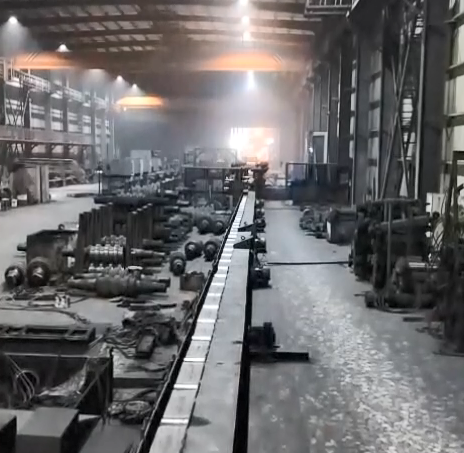Rebar mill machine
As a manufacturer specializing in mechanics and industrial manufacturing systems, I have extensively studied the evolution of metal forming technologies and their impact on large-scale infrastructure development. One of the most crucial machines in modern steel plants today is the rebar mill machine — an integrated system designed for the continuous production of steel reinforcement bars, or rebar.

This article aims to present an expert perspective on the core functions, configurations, and benefits of the rebar mill machine, offering insights that can help international investors, engineers, and procurement teams make informed decisions when selecting or upgrading rebar production lines.
What Is a Rebar Mill Machine?
A rebar mill machine is a specialized type of hot rolling equipment used for producing steel bars with high tensile strength, mainly used in construction and civil engineering. These machines convert billets — semi-finished steel products — into finished rebars through a series of heating, rolling, cutting, and cooling processes.
The final products typically range in diameter from 6 mm to 40 mm, and can be produced in standard lengths or coils, depending on customer requirements.
Core Components of a Rebar Mill Machine
An industrial-grade rebar mill machine is composed of several key subsystems:
-
Billet Heating Furnace:
Reheats steel billets to temperatures around 1100–1250°C, making the metal malleable for rolling. -
Rolling Mill Stands:
A sequence of horizontal and vertical rolling stands reduces the billet cross-section gradually, shaping it into round bars with ribs. -
Quenching and Tempering System (Thermex):
Rapid cooling improves the surface hardness while retaining core ductility — essential for high-strength rebars. -
Flying Shear and Cutting System:
Cuts bars into required lengths during high-speed rolling, ensuring minimal tolerance error. -
Cooling Bed and Collection System:
Uniformly cools the finished bars and aligns them for bundling and packaging. -
Automatic Bundling and Weighing:
Streamlines the final step before storage or dispatch, improving warehouse efficiency.
Modern machines are often PLC-controlled and fully automated, minimizing human error and maximizing productivity.
Advantages of Modern Rebar Mill Machines
Investing in an advanced rebar mill machine brings a wide array of benefits to steel producers:
-
High Production Speed:
Capable of producing up to 30–50 tons per hour, depending on the configuration. -
Energy Efficiency:
New-generation rolling mills use regenerative burners and optimized motor drives to reduce fuel and electricity consumption. -
Product Consistency:
Computer-controlled rolling and quenching ensure mechanical properties meet international standards such as ASTM, BS, or ISO. -
Reduced Material Waste:
Precise cutting and shape control reduce scrap loss, enhancing material utilization. -
Automation and Safety:
Enhanced operator safety and reduced manpower needs through real-time monitoring and intelligent fault detection.
Industrial Applications and Market Demand
Rebars are the backbone of reinforced concrete — used in bridges, highways, buildings, tunnels, and dams. Global demand for construction steel has surged in both developing and developed economies, making rebar production a highly profitable sector.
Key markets include:
-
South Asia: Rapid urbanization and government infrastructure projects
-
Middle East & Africa: Housing, energy, and industrial park development
-
Latin America: Earthquake-resistant construction and infrastructure upgrades
-
Eastern Europe: EU-backed civil engineering projects
In all these markets, clients require reliable rebar mill machines that offer both quality and cost-effectiveness.
Customization and Innovation in Rebar Mill Technology
Advanced rebar mill manufacturers offer tailored solutions for diverse production needs:
-
Compact Rebar Mills: For small to medium-scale producers
-
High-Speed Mills: For large integrated steel plants
-
Flexible Coil Rebar Systems: For producing rebar in coils, ideal for export
-
Digital Monitoring & IIoT Integration: For predictive maintenance and remote diagnostics
Innovations in servo drives, induction heating, and real-time quality inspection are transforming rebar production into a smart manufacturing process.
Choosing the Right Rebar Mill Machine Manufacturer
For international buyers, selecting a trustworthy rebar mill machine supplier is critical. Important evaluation factors include:
-
Technical Expertise & Engineering Support
-
Proven Project Case Studies
-
Global Installation Experience
-
Spare Parts and After-Sales Service Availability
-
Compliance with Local Electrical and Safety Standards
A long-term relationship with a quality manufacturer ensures reliable operation, reduced downtime, and a strong return on investment.
Final Thoughts
From an academic and industrial standpoint, the rebar mill machine represents a blend of mechanical innovation and real-world productivity. As global infrastructure needs grow, the demand for efficient and eco-friendly rebar production systems will only increase.
Manufacturers and investors who prioritize automation, energy efficiency, and product quality in their rebar mill setup will gain a competitive advantage in the international market. By selecting the right technology partner and optimizing operational workflows, businesses can build a resilient and future-ready steel production ecosystem.

